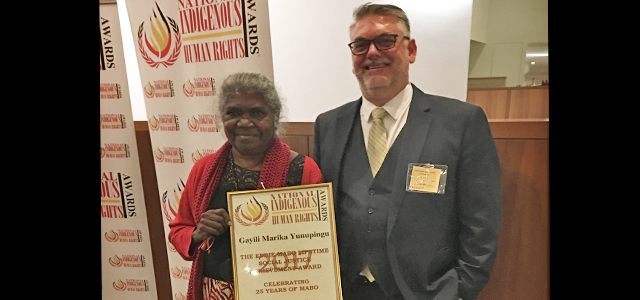Aboriginal elder, Gayili Yunupingu, who established a Wesley LifeForce suicide prevention network and helped reduce an alarming suicide rate in her Northern Territory community has been honoured with a major human rights award.
Ms Yunupingu was awarded the Eddie Mabo Social Justice Award by Bonita Mabo, wife of the late Indigenous land rights pioneer Eddie Mabo, in a ceremony in Canberra.
The lifetime achievement award was one of three National Indigenous Human Rights Awards.
It was a moving and memorable occasion with Ms Yunupingu and Mrs Mabo being moved to tears during a poignant embrace.
“The job is not finished,” Ms Yunupingu said.
ACT Human Rights Commissioner Helen Watchirs commended Ms Yunupingu and Wesley Mission’s Suicide Prevention work.
According to Ms Yunupingu, her community by necessity entered into the work of suicide intervention and prevention in 2007 and was extremely pleased to receive support from Wesley LifeForce in 2011. At that time completed and attempted suicides were high relative to the size of the community, particularly among young Aboriginal men.
At one stage the Gunyangara community had the highest per capita rate of suicide in the world. By this time, Ms Yunupingu and her community were carrying the weight of the work. The Gunyangara (Ski Beach) and Galupa communities began to have open discussions on country to explore ways in which the community could mitigate suicide in a way that was in line with Yolngu protocols.
Discussions began and focused upon strengths based community capacity strategy. These discussions helped maintain community ownership and made people feel they could deal with a crisis.
Yolngu people continually state that only ‘Yolngu can solve a Yolngu problem’. They believe that only Yolngu people can properly understand and communicate with a Yolngu person who is in a critical state of anxiety.
Under Ms Yunupingu’s leadership the people of Gunyangara also established night patrols to monitor people at risk in the community.
Since early 2011, Wesley LifeForce has worked closely with the community by offering it the opportunity to be part of a national community empowerment program. Wesley LifeForce Suicide Prevention networks increased discussion and support for community-led solutions and also helped organize a Live and Learn event which provided suicide bereavement support and prevention on World Suicide Prevention Day in 2011.
The networks support cultural awareness across the sector regarding issues affecting suicide and community voices being heard through a more formal structure. This means promoting ways to help address suicide risk at a community and family level, rather than just at an individual level.
The networks also provide the necessary support to gather the partnerships required for prevention as well as intervention; and increasing knowledge of their work and ability to act as a model for other communities.
By 2014 there had been no completed suicides in the East Arnhem community, according to Nhulunbuy Police.
Due to stronger networking the Galupa Marngarr Suicide Prevention group began to be recognized for its work and continues to be invited to share its knowledge and expertise with other communities like Groote Eylandt.
In 2014 Federal more than 50 members of parliament and senators heard about the work of the Galupa Marngarr Suicide Prevention group and Wesley LifeForce during a presentation at Parliament House, Canberra.
The CEO of Wesley Mission the Rev Dr Keith Garner said Wesley Mission was delighted that Ms Yunupingu had been recognized for her leadership, passion and dedication.
“Gayili has been a strong and hard-working leader of her community,” Dr Garner said. “Her commitment to the cause of suicide prevention has been a model for all communities across the nation.”
Wesley LifeForce has trained more than 40,000 Australians in suicide prevention and has helped establish around 70 community based suicide prevention networks across metropolitan, regional, rural and remote Australia.












